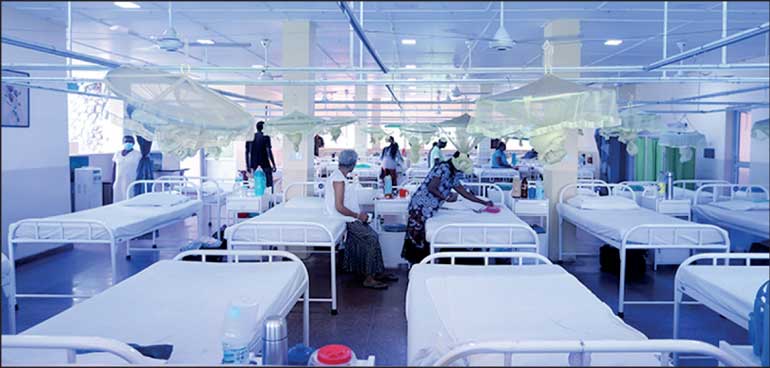Saturday Feb 07, 2026
Saturday Feb 07, 2026
Saturday, 11 May 2024 00:06 - - {{hitsCtrl.values.hits}}

It is time to lobby health authorities to decide with due responsibility on new cancer treatment centres
 A month ago, I had a frantic call from a distant contact who wanted to know if I could arrange for cancer treatment at “Apeksha” that same day, as they have been very curtly told, “come next week.” They had come on a confirmed appointment, he told me. His problem was, the hire for the van was over Rs. 30,000 and they simply cannot afford that fare yet again in a week.
A month ago, I had a frantic call from a distant contact who wanted to know if I could arrange for cancer treatment at “Apeksha” that same day, as they have been very curtly told, “come next week.” They had come on a confirmed appointment, he told me. His problem was, the hire for the van was over Rs. 30,000 and they simply cannot afford that fare yet again in a week.
“Apeksha” in Sinhala is “Hope” though not the most apt name for a hospital. A hospital should hold more than mere “hope” for patients and their guardians. Anyway, Apeksha is the only hope for cancer patients in Sri Lanka for now. Sadly, the National Cancer Institute (NCI), the only teaching hospital for cancer does not provide up to date information and data with everything posted in the official website being that of year 2019 (https://www.ncisl.health.gov.lk/?page_id=109). Obviously, the numbers are all way above than what is available in the “2019 Performance Report”.
Going by numbers available, Apeksha is a growing and an expanding centre that now occupies over 10 acres in Maharagama, close to the town and in a densely populated, highly residential area. One factor yet wholly ignored is that during the past decades, Apeksha has grown into a fast-expanding radioactive hub that may have numerous impacts on residents around. Radio activity apart, even in 2019, Apeksha had a massive staff that too impacts on residents around. It then had 52 Consultants that included Oncologists, Oncosurgeons, Oncogynaecologists, Haematooncologists and Physicians with 262 GPs, supported by more than 1,700 health workers including nurses, pharmacists, radiographers and MLTs.
Records show, despite eight main treatment centres spread from Thelippalai Base Hospital in Jaffna to Teaching hospital at Karapitiya, backed by 16 subsidiary centres from Vavuniya to Hambantota, Apeksha has patients streaming in daily for treatment from every part of the country. There is apparently no referral system for Apeksha as the NCI to accept patients. All Consultants do channel practise in Colombo city and they are often the conduit for patients to register for treatment at Apeksha. There is also very strong patronage for Apeksha with large neighbouring charities and trusts, providing almost all necessary support services free of charge for patients, that provides good reason for patients to seek treatment at Apeksha.
All of them have created a social mindset that Apeksha is the only “hope” for cancer patients. Common thinking there again is that, all those 24 outstation treatment centres have no proper facilities and expertise to treat cancer patients and that is no false thinking too. Charities and trusts clustered around Apeksha thus have a growing clientele to justify their presence to help out daily arrivals. Help those helpless who come to Apeksha wanting blood and scan investigations, travel expenses, livelihood, nutritional food, to dry food packages.
Apeksha have thus gained a donor fraternity who flock to Maharagama to provide everything from equipment and scanners to multi-storey buildings. A four-storey building with children’s wards equipped with modern facilities is being built by the Ruhunu Katharagama Kovil Fund, with Chief Magistrate Colombo and former Governor Northern Province also visiting to see the final appearance of this new block. It beats all logic why the Ruhunu Katharagama Kovil Fund should come to Maharagama to expand Apeksha with a multi-million-rupee construction, instead of further improving the main treatment centre at the Hambantota hospital in their own area. That would have reduced the hassle and burden on patients and guardians who are compelled to travel all the way to Maharagama regularly and also reduce the workload at Apeksha, with less stress for the staff.
In 2022 September, Sri Lanka cricket team that won the Asia Championship donated half a million USD (around Rs. 160 million) to Apeksha. Why Apeksha? That money should have been channelled by the Health Ministry to establish a modern treatment centre in a distant town with more lobbying for extra funds if needed. A modern treatment centre with facilities in a town like Vavuniya or Badulla would have relieved Apeksha of all patients and guardians who travel with difficulty from the North and the East. For patients that relief would have been as good as any palliative care. For guardians the hassle of handling a patient during two or three days, travelling from the north or east of the country to Maharagama, 16 km south of Colombo city would have been a welcome breather.
But why was establishing of two or three extensions of Apeksha in other main provincial centres never been planned for? Why are all donations, all expansion and modernising restricted to Apeksha and to nowhere else? Funds could never be the issue to establish two or three provincial cancer treatment centres. Buildings and equipment can be funded for sure. But that does not complete a treatment centre. There are other issues with human resources. Issues with medical professionals and technicians and also with big-time charities and trusts, that keep everything centralised around Apeksha.
Medical professionals, apart from their very lucrative private practises in Colombo they would never have in provincial towns, also have other issues like schooling for children. Almost all have their children either in the best of Colombo schools or in an international school preparing for foreign exams. They have developed an affluent culture, with big shopping malls, swimming pools and high-end restaurants for weekends. In short, as a family, they do not want to miss out on the urban middleclass routine they are used to. It’s the mega-city based free market economy that accrues everything in Colombo. Keep professionals and specialist consultants tied to Colombo. Apeksha thus remains and expands where it is in Maharagama.
Charities and trusts for cancer support work therefore cannot leave Maharagama. They need to project themselves as partners of NCI Apeksha, to raise funds. As indispensable service providers for not only patients but to their guardians as well. Also, the influence charities and trusts have on Health Ministry hierarchy should not be underestimated. Them apart, medical professionals have strong influence in the Ministry on planning and decision making with important administrative positions held by medical doctors.
Therefore the status quo there is with Apeksha being the main cancer treatment centre, charities and trusts facilitating patient traffic to Apeksha from all corners of the country, is being maintained through half-hearted projects like the NCCP since 1980. NCCP was introduced as proposed by the WHO for “prevention and control of cancer” and responsible for “policy, advocacy, monitoring and evaluation of prevention and control of cancers and conducting surveillance of cancers and facilitating research related to cancer.” What have they achieved and contributed to, in any they were mandated for?
The efficiency of its prevention and control can be judged with their own published data. Five years after the program was launched, in 1985 the incidence of cancer recorded was 5,012 and thereafter every five-year period showed an increase of new cases until in 2010 the number of new cases of cancer reached 16,963. In year 2021 it was a total of 37,753 new cases. The “Cancer Incidence & Mortality Data 2021” publication says around 103 new patients are diagnosed every day.
The picture is quite clear. With inefficient programs and a heavy focus on curative healthcare, we have developed a massive cancer treatment complex with charities and trusts facilitating the needs of most patients and their guardians who visit Apeksha, while incidence of cancer keeps ever increasing. But how far can we go on with this heavy, illogical centralising of cancer treatment and its support services? Do we have to keep pushing residents around Apeksha further away and invest whatever donations available in expanding Apeksha, while charities and trusts would gain from increasing numbers of patients with no option but to visit the only cancer treatment centre Apeksha?
I believe we have long passed the time few other well-equipped treatment and palliative care centres should have been established in the provinces. At least this late, when deaths due to cancer too keep increasing, with 2019 counting 15,598 deaths. I expect all charities and trusts involved with cancer treatment to agree, patients and their guardians should not be inconvenienced and left to travel whole days to Apeksha by denying them the right for treatment and medication in their own provinces. It is no easy travel for elderly cancer patients under treatment to take bus rides from Lunugamvehera, Mannar, Kilinochchi or Kalmunai to Apeksha Maharagama and then get back after radiation or chemotherapy. Charities and trustees should accept organising travel expenses, free stay-overs and meals at Apeksha are no alternatives to the right of patients to have proper treatment closer to home.
The immediate lobby now should be to establish well-equipped treatment centres with adequate qualified staff at least in Vavuniya, Kurunegala and Badulla. Charities and trusts could move in to provinces with palliative care and other support services like counselling, livelihood opportunities, travel expenses, and child sponsorships. Apeksha could then be the NCI that attends to special cases with heavy surgeries and intensive care on referral and also the teaching and training school for nurses specialised in cancer treatment. It is time to lobby health authorities to decide with due responsibility on new cancer treatment centres.